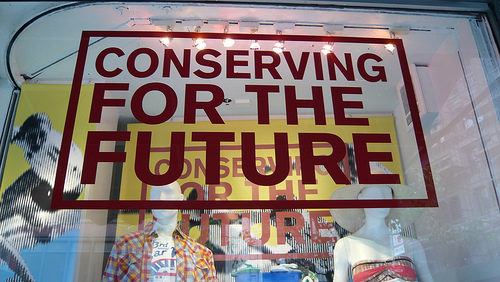 Green is a hot trend, and businesses try to capitalize on consumers’ concern for the environment by touting their products’ eco-friendly traits. “Recyclable”, “natural”, “compostable”, “biodegradable”, “organic”…what do these terms mean? Unfortunately for consumers, there are no standards or consensus about what green actually signifies.
Green is a hot trend, and businesses try to capitalize on consumers’ concern for the environment by touting their products’ eco-friendly traits. “Recyclable”, “natural”, “compostable”, “biodegradable”, “organic”…what do these terms mean? Unfortunately for consumers, there are no standards or consensus about what green actually signifies.
The Federal Trade Commission (FTC) is the governmental agency in charge of protecting consumers. In 1938, Congress passed the Wheeler-Lea Amendment which prohibited “unfair and deceptive acts or practices,” giving the FTC responsibility to enforce “federal CONSUMER PROTECTION laws that prevent FRAUD, deception, and unfair business practices”. Thus, the FTC has gotten involved with green marketing.
The FTC recently revised its Part 260-GUIDES FOR THE USE OF ENVIRONMENTAL MARKETING CLAIMS (aka Green Guides), which was first introduced in 1992. Although compliance by business is voluntary, “conduct inconsistent with the positions articulated in these guides may result in corrective action.” The Green Guides specifically address eight environmental marketing claims:
- General environmental benefit claims
- Degradable/biodegradable/photodegradable
- Compostable
- Recyclable
- Recycled content
- Source reduction
- Refillable
- Ozone safe and ozone friendly
Key revisions to the Green Guides include requirements such as biodegradation must occur within one year of disposal, and renewable energy claims must disclose the source. Furthermore, recycling claims should address the limited availability of recycling programs, and seals and certificates are considered endorsements requiring disclosure of the relationship between the certifier and the company.
The FTC offers the following advice:
When you evaluate environmental claims in advertising and on product labels, look for specific information. Determine whether the claims apply to the product, the packaging, or both. For example, if a label says “recycled,” check how much of the product or package is recycled. The fact is that unless the product or package contains 100 percent recycled materials, the label must tell you how much is recycled…
Vague or general claims may sound warm and fuzzy, but generally offer little information of value. Claims that a product or service is “environmentally friendly,” “environmentally safe,” “environmentally preferable,” or “eco-safe” or labels that contain environmental seals — say, a picture of the globe with the words “Earth Smart” around it — are unhelpful for two reasons: First, all products, packaging and services have some environmental impact, although some may have less than others. Second, these phrases alone do not provide the specific information you need to compare products, packaging, or services on their environmental merits. Look for claims that give some substance to the claim — the additional information that explains why the product is environmentally friendly or has earned a special seal.
My advice is to support companies you trust with existing green reputations. Choose companies that have always been green rather than those that have recently jumped on the eco-friendly bandwagon. Read labels and use your best judgement as to whether you feel the product truly is environmentally-friendly. Shop at stores and websites that do the research for you and only sell green products. Always use a critical mind when shopping to avoid greenwashing claims. If you have any doubts about a claim, check out Terrachoice’s Seven Sins of Greenwashing site for guidance.
Image: ![]()
![]() Some rights reserved by pashasha
Some rights reserved by pashasha


Green Beauty Girl
Great information. I will check out the 7 sins of green washing site and spread the word. Thanks for the tips.
Rich Welch
Information that is sorely needed by the consumer. Unfortunately, you won’t see Yahoo printing this up next to their “Dirty Dozen.”